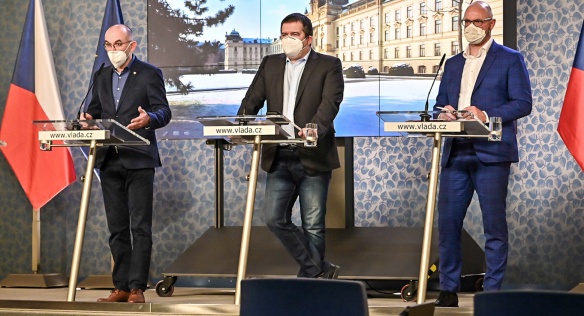Press Advisories
15. 2. 2021 21:08
Government approves draft changes to crisis legislation and pilot project for testing in schools
The draft amendment to the Constitutional Act on the Security of the Czech Republic is meant to enshrine a "state of danger" in the Czech legislation. Under the Crisis Act, this can currently only be declared by regional governors, whereas the government is proposing that it could also declare this state of danger for the whole country or part thereof. The proposal also fills in and clarifies the provisions on extending the electoral period and postponing elections, enshrines the Central Crisis Staff at a constitutional level and clears up the publication of decisions announcing states of crisis.
These changes are then elaborated into specific details in an amendment to the Crisis Act, a draft of which the government also took up. This legislation lays out in greater detail the permissible infringement on the rights and freedoms guaranteed by the Charter of Fundamental Rights and Freedoms, not just on the part of the government, but also on the part of regional governors and the mayor of Prague, for whom the right to declare a state of danger remains. Among other things, the amendment governs the jurisdiction of the Central Crisis Staff and enshrines the government's right to issue orders extending deadlines and the validity of documents during times of crisis and limit the performance of official activities. Further information is contained in the Interior Ministry's press release at https://www.mvcr.cz/clanek/ministerstvo-vnitra-pripravilo-zmeny-bezpecnostni-a-krizove-legislativy-zlepsi-schopnost-statu-zvladat-krizove-situace.aspx (in Czech language).
At the meeting, the Minister of Health submitted an Act on Emergency Measures during the COVID-19 Epidemic. This piece of legislation is meant to deal with the implementation of anti-epidemic measures in situations where there is no state of emergency in place in the Czech Republic, above and beyond the existing wording of the Public Health Protection Act, while also preserving a maximum of rights and taking into account the legitimate interests of the population.
The draft act sets out the legal boundaries for issuing measures aiming to limit further spread of COVID-19 by restricting certain activities and services that pose a risk from an epidemiological standpoint, or to order certain activities that prevent the spread of this illness. It specifies and defines the regime of emergency anti-epidemic measures, also clarifying the sanctions that can be imposed for violating obligations laid down by emergency measures, which can reach CZK three million. The details can be found in the Health Ministry's press release at https://www.mzcr.cz/tiskove-centrum-mz/zakon-o-mimoradnych-opatrenich-pri-epidemii-covid-19-umozni-ministerstvu-zdravotnictvi-vydavat-nektera-opatreni-i-bez-nutnosti-nouzoveho-stavu/ (in Czech language).
The government also approved an amendment to the Government Order on the Use of the Czech Armed Forces for Rescue Work in Connection with Demonstrated Occurrence of the SARS CoV-2 Coronavirus. In addition to the current 900 soldiers in active service helping out at social service and medical facilities, the amendment allows an additional 150 soldiers to be mobilised for the needs of the state-guaranteed network of collection centres, which are currently overloaded.
Cabinet furthermore approved an extension of the Ministry for Regional Development's programme Covid – Spas for the period from 1 January 2021 to 31 December 2021. An extension of the grant heading, which is meant to help maintain the scope and quality of spa services provided by supporting increased demand for treatment and preventive stints at spa facilities, was made possible by the European Commission's decision to extend the validity of what is known as the Temporary Framework through to 31 December 2021, also increasing the amount of support a business could receive from the current EUR 800 000 to EUR 1.8 million per entity. More in the press release of the Ministry for Regional Development at https://mmr.cz/cs/ostatni/web/novinky/dostalova-lide-mohou-vouchery-do-lazni-vyuzit-do-k (in Czech language).
Ministers also discussed the promised return of school attendance for pupils and students. A condition for their return to schools is the launching of mass regular testing for students and school employees. The government also took up a document from the Ministry of Education, Youth and Sport entitled Securing the Purchase and Distribution of Tests for Mass Regular Testing for the Presence of COVID-19 at Schools for a Pilot Period.
The timeline for returning envisions the opening of final years of secondary schools, conservatories and higher vocational schools 1 March 2021, secondary schools for practical instruction from 8 March 2021 and primary schools for 9th graders from 15 March 2021. It counts on the need for tests ranging from 267 440 a week up to 913 156 a week once all three waves have been launched. The pilot period will run from 1 March to 2 April 2021.
The Ministry of the Interior will provide for the procurement and distribution of suitable non-invasive antigen tests, which must meet the condition of high accuracy and EU certification.
The government also looked at the draft of a new Act on Digitisation of Healthcare and the associated amendment bill. The goal of the law is to harmonise the existing fragmented legislation and legally enshrine new technologies in the field of digitisation of the health sector, which among other things will allow the systematic implementation of modern and shared rules for personal data protection and cybersecurity requirements. Details are contained in the Health Ministry's press release at https://www.mzcr.cz/tiskove-centrum-mz/vlada-schvalila-zakon-o-elektronizaci-zdravotnictvi/ (in Czech language).
Cabinet also approved a draft amendment to the Act on State Holidays, Other Holidays, Significant Days and Days of Rest, which was submitted by the Minister of Foreign Affairs. The ministry is proposing that 4 February, a day associated with the departure of John Amos Comenius into exile in 1628 and his farewell to his homeland, become a "significant day" in the Czech Republic as the Day of Czechs Abroad. It is meant to commemorate the role of the Czech diaspora in spreading the good name of the Czech Republic abroad and to appreciate its contribution to the development of Czech society. More detailed information is contained in the press release of the Ministry of Foreign Affairs at https://www.mzv.cz/jnp/cz/udalosti_a_media/tiskove_zpravy/x2021_02_15_cesi_v_zahranici_budou_mit_svuj_vyznamny.html (in Czech language).
The government discussed and approved several instances of humanitarian aid from the Czech Republic abroad as well. It approved the priorities of the Interior Ministry Concept for Assisting Refugees and States under Strong Migrational Pressure for 2021. The Ministry of the Interior will have CZK 140 million at its disposal for the On-Site Assistance programme this year, and cabinet approved freeing up the first 5 million for the project Aid in Providing for the Basic Needs of Refugees and Migrants in Bosnia and Herzegovina.
Another CZK 55 million will be available for distribution this year by the Permanent Medical Humanitarian Programme MEDEVAC, which helps improve healthcare in selected regions – in the Middle East, in Northern Africa and the broader Sahel region, and in the countries of Eastern Europe. The government gave its consent to the granting of three CZK 5 million donations to projects in Mauritania, Iraq and Nigeria. You can find summarised information on humanitarian aid in the Interior Ministry's press release at https://www.mvcr.cz/clanek/195-milionu-pro-blizky-vychod-balkan-afriku-i-vychodni-evropu-programy-pomoc-na-miste-a-medevac-pomohou-i-letos.aspx (in Czech language).
The Czech Republic will also send CZK 300 000 to aid Czechs living in Croatia in the area hit by a strong earthquake in December 2020. Among the most affected cities were Sisak and Petrinja to the south-east of Zagreb. The money will be earmarked for covering essential costs associated with the need to quickly rebuild the damaged homes and providing for other needs arising from this emergency.
Useful information
- Hotline
Ministry of Transport
+420 225 131 820
Ministry of Industry nad Trade
+420 224 854 444
Ministry of Foreign Affairs
+420 224 183 200
Ministry of Interior (borders, security)
+420 739 608 533
Ministry of Education, Youth and Sports
+420 778 725 602
- Current information on Covid-19 caused by the Chinese coronavirus on the website of the Ministry of Health – information for citizens and healthcare workers, current data.
- Entry into the territory of the Czech Republic
- The European coronavirus response team







